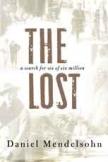The Tears in Things
In recent years, complaints have been heard about the Holocaust industry. Yiddishists have warned that all this stress on destruction obscures the flourishing European Jewish culture that was swept away. And ordinary readers, familiar with a host of powerful books, from The Diary of Anne Frank to Maus, may wonder if there is anything new to be said on the subject.
Well, there isor at least there is a new perspective; it comes from the classicist-journalist Daniel Mendelsohn, who traces the fate of his great-uncle, Shmiel (Sam) Jäger, his wife, Ester Schneelicht, and their four daughters, Lorka, Frydka, Bronia and Ruchele, from Bolechow, Poland (now Bolekhiv, in Ukraine), all of whom were murdered by the Nazis.
Actually, Mendelsohn knew that much before he launched his decades-long quest for information about his relatives, beginning with his precocious quizzing of his grandfather Abraham (Schmiel’s brother, who died in 1980). And the point of his search proved not to be any stunning revelations about the lost, but the search itself, which took him all over the world, to Bolechow and many other cities in eastern Europe, to Israel, Australia, Sweden and (on a separate trip) Denmark, to speak with as many of the 48 survivors of Bolechow as possible, with friends and acquaintances of the lost, and with some very old gentiles, mostly Ukrainians, who knew or remembered them.
In the process, Mendelsohn discovered (what else?) himself, especially his own Jewishness, his siblingsparticularly his brother Matt, who took the many evocative black-and-white photos in the bookand tangled networks of both the living and the dead that he had scarcely dreamt of. In telling his story Mendelsohn weaves an elaborate web of homey childhood reminiscences, quirky travel impressions (where he is part haunted explorer, part keen-eyed tourist), aha-moments of shrewd (and wildly lucky) detective work, swirling, brilliant, self-indulgent Proustian riffs that try, andof necessityfail, to magically recapture the past, but keep on trying anyhow. Additionally, there are intense, looping meditations on crucial parashot (synagogue readings from Genesis), guided by the contradictory tandem of a medieval (Rashi) and a modern (Richard Elliot Friedman) commentator, that cunningly intersect with his tale and give it a deep foundation. And those are just some of the things going on in this incredibly busy narrative. (Some critics have found the book dilatory and self-centered, but that’s the whole idea.)
Mendelsohn also includes repeated allusions to the larger history of the Holocaust within which his relatives were doomed (16-year-old Ruchele was trapped in the first Bolechow Aktion and likely shot to death by a Ukrainian mobile killing squad; 13-year-old Bronia died in the second Aktion; Ester was almost certainly gassed in Belzec; Shmiel and the beautiful 21-year-old Frydka were hidden by a Polish schoolteacher but then betrayed and shot; 23-year-old Lorka joined the partisans and was killed with them), along with reflections on the non-Jewish discipline (classics) to which he has given much of his life. Mendelsohn is, after all, on an odyssey. And he cannot resist quoting that ancient Latin tag, Sunt lacrimae rerum, because, like Aeneas in Carthage, he keeps running into thingsimages (old photos, survivors’ recollections, Yizkor books, etc.) of a vanished, heartbreaking past that make him weep even as they bear witness to the sympathy of others for his losses.
Grief, we know, is both inescapably selfish (as in Hopkins’s It is the blight man was born for,/ It is Margaret you mourn for) and the ultimate homage to the dead. Mendelsohn readily gives way to tearsand persists in calling himself sentimental for doing sobut even more readily slaves away at the endless, baffling task of finding the truth. His informants, half a century after the fact, are frequently mistaken; and by definition, since they were neither victims nor perpetrators, they cannot have witnessed the dreadful final minutes of the Jägers, or anyone else. So Mendelsohn has to sift and study dozens of conflicting accounts till he can choose the most reliable version. Then he can cry some more.
But there is an odd omission in this bitterly honest voyage of discovery: Mendelsohn’s private life. In his first book, The Elusive Embrace: Desire and the Riddle of Identity (1999), he openly discussed his own homosexuality; but now, in a context where it is quite relevant, he is all but mute. He alludes, vaguely and in passing, to my children, but never explains how he would want to initiate them into the tragic legacy he has uncovered. In his final biblical meditation he turns to the wipe-out of Sodom and Gomorrah in Genesis 19 (presumably, to a godless humanist like himself, an explosion of monstrous homophobia), but again says nothing pertinent. And, strangest of all, he dedicates the book to no one in his family, but to two dead women friends.
No matter. The Lost is an extraordinarily rich, dense and rewarding book. The tears Mendelsohn finds in things touch all of us, not just because the Holocaust refuses to go away (Primo Levi committed suicide 42 years after being rescued from Auschwitz), but because through the twists and turns of his hyper-literary, hyper-esthetic, hyper-sensitive time travelogue, he never loses sight of Horace’s immortal dictum, Si vis me flere, dolendum est,/ primum ipsi tibi (If you want me to weep, you first have to grieve yourself).
This article also appeared in print, under the headline “The Tears in Things,” in the May 14, 2007, issue.








